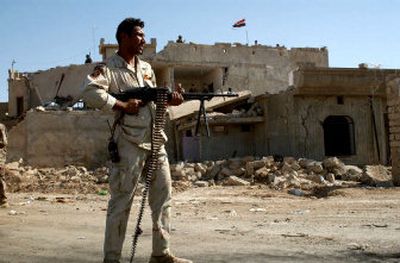U.S. troops wounded in Iraq at 2-year high

WASHINGTON – The number of U.S. troops wounded in Iraq has surged to the highest level in nearly two years as Americans fight block-by-block in Baghdad to try to check a spiral of sectarian violence that U.S. commanders warn could lead to civil war.
Last month, 776 U.S. troops were wounded in action in Iraq, the highest number since the military assault to retake the insurgent-held city of Fallujah in November 2004, according to Defense Department data. It was the fourth-highest monthly total since the U.S.-led invasion in March 2003.
The sharp increase in American wounded – with nearly 300 more in the first week of October – is a grim measure of the degree to which the U.S. military has been thrust into the lead of the effort to stave off full-scale civil war in Iraq, military officials and experts say. Beyond Baghdad, Marines battling Sunni insurgents in Iraq’s violent western province of Anbar last month also suffered their highest number of wounded in action since late 2004.
More than 20,000 U.S. troops have been wounded in combat and 2,700 killed in the Iraq war. While much media reporting has focused on the number of dead, military experts say the number of wounded is a more accurate gauge of the fierceness of fighting because advances in armor and medical care allow many service members to survive who would have perished in past wars. The ratio of wounded to killed among U.S. forces in Iraq is about 8 to 1, compared with 3 to 1 in Vietnam.
“These days, wounded are a much better measure of the intensity of the operations than killed,” said Anthony Cordesman, a military expert at the Center for Strategic and International Studies in Washington.
The surge in wounded comes as U.S. commanders issue increasingly dire warnings about the threat of civil war, all but ruling out cuts in the current contingent of more than 140,000 U.S. troops before next spring. Last month Gen. John Abizaid, the top commander in the Middle East, said “sectarian tensions, if left unchecked, could be fatal to Iraq,” making it imperative that the U.S. military focus its “main effort” squarely on Baghdad.
Thousands of additional U.S. troops have been ordered to Baghdad since July to reinforce Iraqi soldiers and police who failed to halt – or were in some cases complicit in – a wave of hundreds of killings of civilians by rival Sunni and Shiite groups.
U.S. commanders have appealed for weeks for 3,000 more Iraqi army troops to help secure Baghdad but as of Thursday had received only a few hundred, according to military officials.
“The Baghdad security plan and the general spiral of operations is driving us to be more active than we have been in recent months,” said Michael O’Hanlon, a military analyst at the Brookings Institution, a Washington-based think tank. “We have more people on patrols and out of base, so we get more people hurt and killed in firefights,” he said, explaining that U.S. military offensives – more than other factors such as shifting enemy tactics – tend to drive the number of American casualties.
In March, Defense Secretary Donald Rumsfeld said Iraqi forces – not U.S. troops – would deal with a civil war “to the extent one were to occur.” Today’s operations in Baghdad demonstrate that that goal was not realistic, experts say.
“In a sense, the Baghdad security plan is a complete repudiation of the earlier Rumsfeld doctrine where he said the Iraqis would prevent the civil war,” O’Hanlon said.
Despite the mounting cost in U.S. wounded and dead – including 13 American soldiers killed in combat in Baghdad in three days last week – Pentagon officials say aggressive military operations in the capital are at best a short-term and partial solution, buying time for political compromise, which they call the only way to arrest Iraq’s disintegration.
“The Baghdad security plan will only be a temporary fix,” said a Pentagon official who has served in Iraq. “You need to address the root causes,” said the official, who spoke on the condition of anonymity because he was not authorized to speak publicly on the issue.